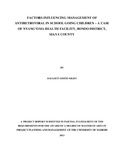| dc.description.abstract | The purpose of this study was to assess those factors influencing the management of
Antiretroviral Therapy in school going children in Bondo District, Siaya County, Nyang’oma
Health Care Facility. The objective of this research is to assess how time factor influences the
management of antiretroviral management in school going children, assess related challenges
faced by the caregivers of children undergoing antiretroviral therapy, their dietary requirements
and how the age of the child influence antiretroviral therapy and management during their
schooling. The study employed a cross sectional descriptive survey research and used
questionnaires and structured interview guide to collect data. The target population of this
research was school going children on antiretroviral therapy and their caregivers who may be
HIV positive or not and are accessing antiretroviral treatment and care from Nyang’oma health
care facility. The sample size for study was 72 units, 36 adult caregivers and 36 children between
the ages of 8 to 18. Data analysis on socio-demographic assessment, antiretroviral management
in school going children, choice and place of livelihood by the caregivers of such children, diet
requirement for children undergoing antiretroviral therapy, qualitative data, some of the
perceived problems and their solutions was done by use of inferential statistics of partial
correlation of the independent variables of time, caregivers, diet and age of the child against the
dependent variable of effective management of antiretroviral therapy. Major findings of the
study depicted that 66.7% of caregivers worked in the same town as the school of the child and
had to be home to give medication to ensure proper adherence, 94.6% of the children
respondents attended day schools nearby their homes, 86.2% of the children took their
antiretroviral at home, 79.3% of the children attended clinic other than their earlier appointment
days, 58.6% of the children did not attend co-curricular activities away from school and home,
while 71.4% of the children respondents were in primary school and 7.1% were in secondary
school. The study concluded that there was a strong relationship between the independent
variables, of time, caregivers, diet, age of the child on antiretroviral and the dependent variable,
successful management of antiretroviral therapy. It also concluded that time adherence,
caregivers to the children under antiretroviral, good diet, age of the child and routine clinic visits
are important to the successful management of antiretroviral therapy and that younger children in
primary level need more and closer care from their caregivers, teachers and social workers than
those children in secondary school in order to solve the challenges of good antiretroviral
treatment. The study recommends that more sensitization and capacity building should be done
to caregivers of children undergoing antiretroviral since most of them have education level
below secondary level and the school teachers since they spend most time with the children. It
further recommends that caregivers and teachers should be capacitated in guiding and counseling
skills on HIV care, the ministry of health and education should ensure that there is a staff in
charge of children undergoing antiretroviral therapy in schools with the school health care
facilities upgraded to meet the demands of antiretroviral treatment | en |

